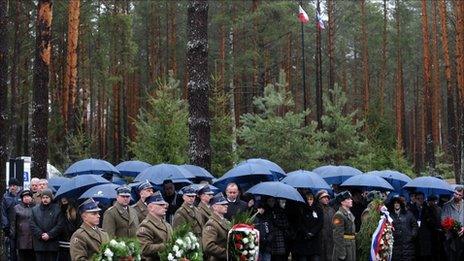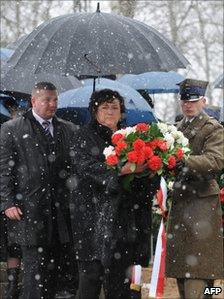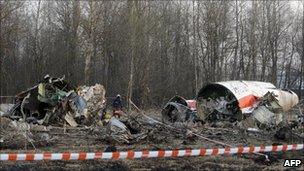Division mars Poland's Smolensk plane crash anniversary
- Published

Thousand gathered at various commemoration events to pay their respects
Poland is marking the first anniversary of the plane crash which killed President Lech Kaczynski and 95 others with rival commemorations highlighting the bitter divisions which still surround the tragedy.
Jaroslaw Kaczynski, the identical twin brother of the late president and leader of the country's main opposition party, Law and Justice, is boycotting the official memorial events.
His supporters are also planning to gather outside the presidential palace to remember the victims and vent their anger against the Russians and the government for their handling of the crash investigation.
For a brief time the tragedy united the country in shock, at first, and then mourning for the victims.
Thousands came from all over the country to place flowers and candles in front of the presidential palace. They did so even if they opposed Lech Kaczynski's policies.
It was the nation's worst disaster since World War Two. Apart from the president and his wife, Maria, the crash claimed the lives of the commanders of the armed forces, the heads of the National Bank and Olympic Committee, and politicians from all parties.
The location of the disaster was hugely symbolic too. The delegation was on its way to attend a 70th anniversary ceremony of the Katyn massacre, one of Poland's most painful wartime events in which more than 20,000 Polish officers, the country's elite, were murdered on Stalin's orders.
'Divisions'

Polish First Lady Anna Komorowski visited the site of the disaster
It is perhaps not surprising that the unity did not last long. Lech Kaczynski was a divisive figure and many Poles disliked his nationalism and combative relations with Germany and Russia.
Divisions arose within days when it was announced that Lech Kaczynski and his wife would be buried among Poland's kings at Krakow's Wawel Cathedral. Many Poles felt the location was inappropriate.
Over the course of the year the tragedy has been used instrumentally by politicians here.
Clearly devastated by the death of his twin, sister-in-law, and many close friends and colleagues, Jaroslaw Kaczynski, a more aggressive and nationalist politician than his brother, has made the crash, and the investigation into it, the central issue for his party.
The investigation was carried out by the Russians because the crash happened at Smolensk military airfield near Katyn.
In January, the Russian investigation released its final report and found that the immediate cause of the crash was the pilots' decision to attempt to land despite extremely poor visibility caused by dense fog at the airfield.
The report also concluded that the pilots were put under pressure to attempt the landing because they expected a negative reaction from Lech Kaczynski if they decided to fly to a reserve airport with better weather conditions. That would have considerably delayed the delegation on its way to the Katyn memorial service.
The Polish government accepted the report's main findings but criticised the Russians for failing to investigate its own role in the tragedy, namely the actions of the air traffic controllers at Smolensk.
Endless news
It was notable however that both countries' foreign ministers stressed that it would not derail the hitherto successful attempts to normalise relations.

The crash was the nation's worst disaster since World War Two
But the fact that the investigation was seen by many here as being neither comprehensive nor fair raised old suspicions about the Russians.
It has also added fuel to conspiracy theories - such as that the Russians artificially created the fog to bring the plane down.
The majority of people here do not believe in those conspiracies, but an opinion poll this week found that 78% of respondents reckon the circumstances of the crash have not been fully cleared up.
Poland has yet to complete its own investigation into the disaster.
Jaroslaw Kaczynski does not accept the findings of the investigation. He has accused the government of "servility" towards the Russians who, he says, "bear direct responsibility for the crash".
He has said that it was Moscow which took the decision to allow the plane to land in such poor weather not the air traffic controllers.
The media has also played an important role over the year. With 24-hour rolling news and so much air time to fill barely a day goes by without a mention of the crash and some new development.
A recent survey said 78% of Poles were bored and irritated of hearing about it all the time. A group of students started a campaign on the social networking site Facebook to have one full day without mentioning the disaster.
The poll also found that 87% believed the crash was being used as a political tool.
Most Poles want Sunday's anniversary to be an occasion that unites the nation rather than divides it.